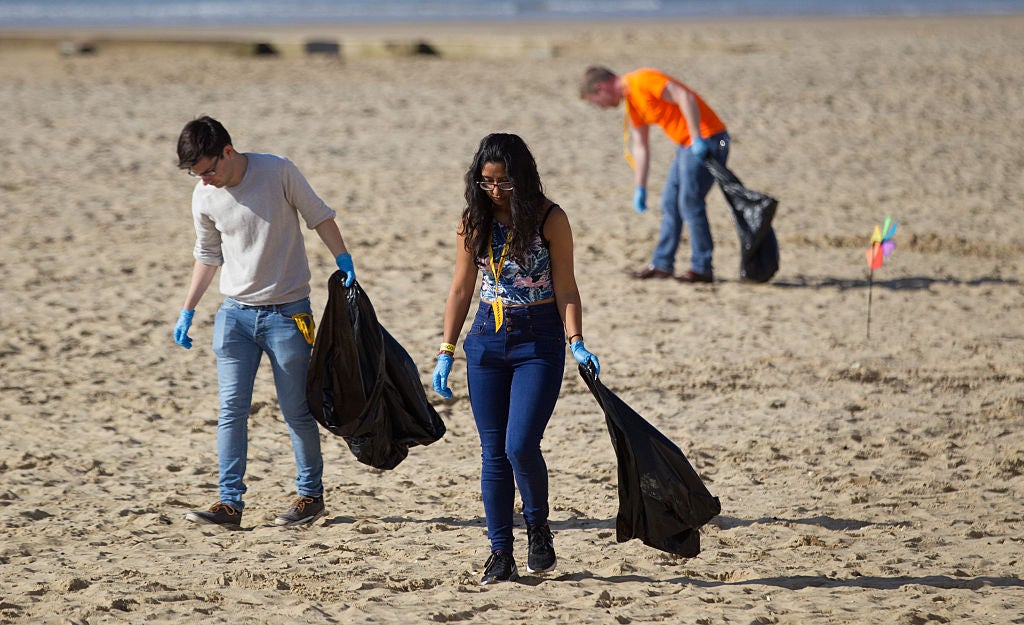UK sees number of plastic bags found on beaches fall 40 per cent thanks to 5p tax
Beaches in England and Northern Ireland saw the biggest drop in the number of plastic bags found during the September clean up

Your support helps us to tell the story
From reproductive rights to climate change to Big Tech, The Independent is on the ground when the story is developing. Whether it's investigating the financials of Elon Musk's pro-Trump PAC or producing our latest documentary, 'The A Word', which shines a light on the American women fighting for reproductive rights, we know how important it is to parse out the facts from the messaging.
At such a critical moment in US history, we need reporters on the ground. Your donation allows us to keep sending journalists to speak to both sides of the story.
The Independent is trusted by Americans across the entire political spectrum. And unlike many other quality news outlets, we choose not to lock Americans out of our reporting and analysis with paywalls. We believe quality journalism should be available to everyone, paid for by those who can afford it.
Your support makes all the difference.The number of plastic bags found on beaches in the UK has almost halved thanks to the introduction of the 5p tax.
In 2015 there were 11 plastic bags for every 100 metres of coastline cleaned in the UK, according to The Marine Conservation Society.
But this year that number dropped to fewer than seven, a decrease of almost 40 per cent and the lowest of the past 10 years.
The charity began calling for action on single use carrier bags in shops back in 2008 and was instrumental in getting a levy introduced in Wales in 2011, Northern Ireland in 2013, Scotland in 2014 and England in October last year.
"In the last decade, our Great British Beach Clean volunteers have found an average of 10 single use carrier bags for every 100 metres of coastline cleaned," said the charity's beach watch manager Lauren Eyles.
"This year, for the first time since the charges were introduced, we've seen a significant drop in the number and that can only be as a result of the 5p charge which is now in place in all the home nations.
"It vindicates the charge, which we predicted would be good news for the marine environment. Thanks to our thousands of fantastic volunteers who collect beach litter data, we can now see the impact these charges have had."
Beaches in England and Northern Ireland saw the biggest drop in the number of plastic bags found during the September clean up - over half compared with 2015.
In Wales, where the charge has been in place for five years, the number - just under four bags for every 100 metres cleaned - is significantly lower than any other year since 2011. In Scotland, volunteers found, on average, one bag fewer over the same distance this year compared with last year.
The charity said there has been a drop of almost 4% in the amount of litter found on UK beaches between 2015 and 2016, with 6,000 volunteers collecting 268,384 items.
Beaches in Scotland saw a decrease of 18% in overall litter levels, rubbish in the North East of England dropped by 14% and in the Channel Islands by 10%. But there were increases in the amount of beach litter in the North West (24%), Wales and the South West (15%) and in Northern Ireland (9%).
Analysis of the data collected by volunteers also showed a rise of over 4% in the quantity of drinks containers found on the UK's beaches - including plastic bottles, bottle tops and aluminium cans.
There was also a 53% rise over the past year in the amount of balloon-related litter found on beaches.
Turtles mistake plastic bags and balloons for their jellyfish prey, and the items can block their digestive systems leading to death from starvation. Some species of seabirds are particularly attracted by the scent of this plastic junk "food".
Join our commenting forum
Join thought-provoking conversations, follow other Independent readers and see their replies
Comments